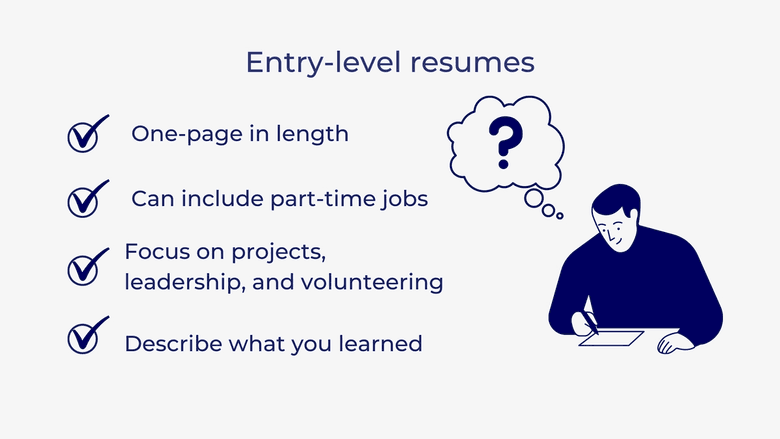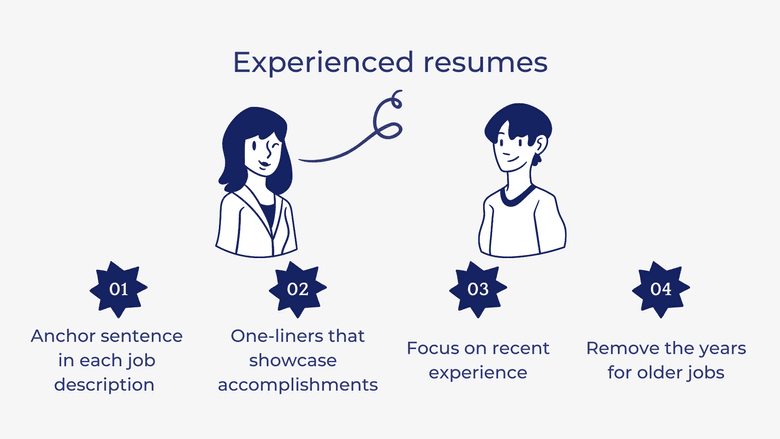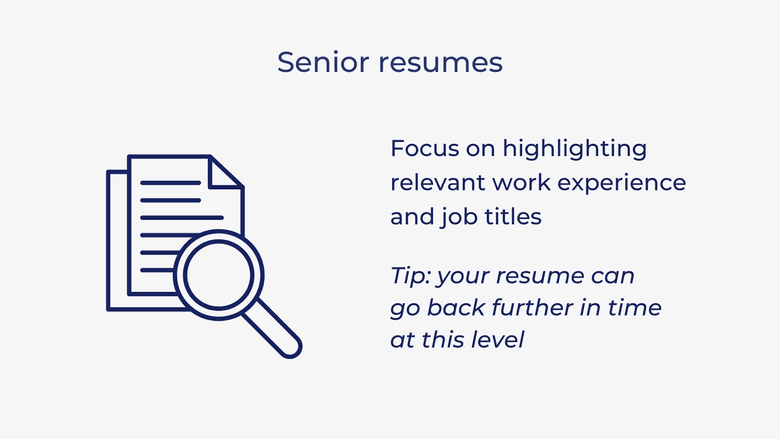How far back should your resume go? Strategies for every career stage
How far back your resume should go differs greatly depending on the seniority of your role. Stop following generic career advice.
How far back should a resume go? Many career experts say no more than 10 years, regardless of who you are or what you've accomplished.
However, this advice doesn't apply to everyone. Resumes vary dramatically by industry, seniority, and type of experience. Be wary of anyone who tells you that one size fits all: trust me, resume building is a lot more nuance than that.
In this guide, we'll break down resume-building tips for job seekers of various experience levels. How far back should your resume go?
Entry-Level Candidates: You Have It the Easiest!

Keep in mind: What you've learned is just as important as what you've accomplished. No one expects you to have the perfect credentials yet.
If you just graduated, you might feel like your work experience is not relevant. Maybe you worked odd jobs to pay for college, or maybe you haven't had a job since high school. This makes many candidates feel like they're not competitive in the market and even prevents people from sending in job applications.
The entry-level resume should focus on what you've learned at each job rather than curating your work experience. It's OK if your career history is not relevant to the job you're applying for - this is the only time you get a free pass in your career. Take advantage of it.
Entry-level jobs have less strict requirements and it's OK if your experience isn't completely relevant. However, you should still follow these tips:
- Be mindful of resume length. Half-page resumes are not ok. The one-page length requirement applies to you too.
- You can include part time jobs and don't have to specify how many hours you worked.
- If you lack employment history, focus on projects, leadership positions, and volunteering experience.
- If you don't have accomplishments to list, describe what you learned in your bullet points.
Cover letters are also important for entry-level jobs.
This is one of the only times cover letters will be important, because candidates rarely have relevant work experience. In your cover letter focus on why you're interested in the role and, even more importantly, the company. Go beyond mentioning the company name: dig deep into the values, products, media presence, and more. Additionally, use this space to tie the role to what you've learned in your recent jobs.
📺 Watch: What Google wants to see in your resume.
Experienced Professionals: Highlight Experience Wisely

Keep in mind: Your resume is a sales tool, not a work history review.
The more years of experience you have, the harder it is to pick and choose which work experience to highlight. I get it - you want to show why you're the best for the job. But going far back in your work history and jam-packing the experience section will have the opposite effect. It will create a negative impression.
Instead of focusing on how far back to go, focus on determining and highlighting your most relevant experience. For instance:
- Have an anchor sentence in each job description that helps recruiters pattern-match to the open position
- Use your bullet points strategically: they should be one-liners showcasing measurable accomplishments
- Focus on recent experience as much as you can
- If you include much older jobs, remove the years from your resume (yes, you can do that)
A warning about age discrimination...
When considering the job search process of experienced professionals, it's important to discuss this form of bias. When crafting your resume, age discrimination is a real concern. Job seekers may not realize this, but everyone has some unconscious bias. Recruiters and hiring managers are no exception. Ageism is ripe in many industries, tech included. Do yourself a favor and make sure the experience section of your resume doesn't hurt your chances of being called in for an interview.
Some ways you can avoid age discrimination are:
- Focus on your work history in the last 10 years
- Focus your work history on relevant experience
- Highlight job titles that align with the role you're applying for
- Use a chronological order and skip all non-relevant positions
- Feel free to omit your graduation dates, or dates attached to older jobs
Senior Candidates: Stop Trusting Online Resume Tips

Senior candidates stay in roles longer on average-- they may only have one or two jobs in a ten year period. Because of that, your resume can go further back than that. As a senior candidate, your focus should be to highlight both relevant work experience and relevant job titles.
For example, don't dig 20 years back to highlight an associate job in a relevant industry. Even though the setting may match up, the work you did as an associate has little to do with your current position.
Resume writing for senior folks is also different. In short: ditch the bullet points. You should briefly explain your accomplishments in narrative form. This is harder to do and most resume writers get it horribly wrong.
Don't hire anyone to help you here. Doing this process correctly requires both:
- A deep understanding of your earlier experience, and
- A strategic look into how experience ties into the company objectives and the job posting.
I often advise senior candidates to write out a few pages (almost like a cover letter) and then edit it down to one page. During this editing process, really focus on what the potential employer needs in this senior role.
So: How Far Back Should a Resume Go?
Going back to our original question - there's no answer that fits all. The best practices for resume building vary depending on the level of the position you're applying for. So please, take all the generalized advice out there with a huge grain of salt. Because at the end of the day, the resume is a sales tool to "sell" YOU! That means it will be tailored to your individual needs and experiences. Start with the tips in this article and build from there. If you do it right, your job application will stand out to recruiters for all the right reasons.
Next up: Which resume outline should you use.
The information provided herein is for general informational purposes only and is not intended to provide tax, legal, or investment advice and should not be construed as an offer to sell, a solicitation of an offer to buy, or a recommendation of any security by Candor, its employees and affiliates, or any third-party. Any expressions of opinion or assumptions are for illustrative purposes only and are subject to change without notice. Past performance is not a guarantee of future results and the opinions presented herein should not be viewed as an indicator of future performance. Investing in securities involves risk. Loss of principal is possible.
Third-party data has been obtained from sources we believe to be reliable; however, its accuracy, completeness, or reliability cannot be guaranteed. Candor does not receive compensation to promote or discuss any particular Company; however, Candor, its employees and affiliates, and/or its clients may hold positions in securities of the Companies discussed.
